A/N: You don't have to look at this before you start the story! You can jump straight to Episode 3, which is, in fact, Chapter 2. This is just for your reference later. You don't need to know all this before you start.
Family Trees
n/b: Properly, Iyu would not be on this family tree at all. He's a bastard, after all. But I thought it would be less useful if he weren't there. Aksana likes him well enough he's functionally somewhere between legitimate and illegitimate, anyway.
Glossary
Akassiya: The southernmost of the Five Oblasts. Steppe and desert, many of the people there are nomadic and/or shepherds.
Chinovnik/chinovnitsa: A title for a court official. Usually, chinovniks are miryanins.
Dyadyushka: Uncle (in an affectionate way).
Gorakino: The westernmost of the Five Oblasts. Long, thin, mountainous. Its western border is the border of the Sundered Lands, and it is responsible for keeping ghosts out of the Five Oblasts.
Khorizova: The easternmost of the Five Oblasts. Largely temperate, with a long coastline, jungle interiors, and highlands in the north. Its capital is Whitecap City; its palace is Whitecap Palace.
Khozyain: Somewhere between a landlord and a mayor. They collect rent and taxes for the knyaz (and themselves). They are meant to advocate for their town’s interests with the court. Whether they actually perform those duties is a hotly contested matter.
Knyaz: Literally translates to “prince” or “duke.” The sovereign ruler of an oblast. The top dog. The head honcho.
Knyazhich: Crown prince, more or less. This properly refers only to a knyaz's heir but is often used to refer to any child of a knyaz or, sometimes, any volshebnik at all.
Miryanin: Literally, "layman." Someone without access to Tajna (myortva and zhiva); the opposite of a volshebnik.
Myortva: Magic energy harvested from the corpse of an animal.
Oblast: A country or state. The Five Oblasts are a loose confederation of states that are somewhere between close allies and a unified nation.
Sundered Lands: The lands to the west of Gorakino, from which volshebnik society fled several generations ago due to the overwhelming presence of ghosts.
Tajna: Literally translates to “mystery” or “secret.” A deity, a system of magic, a philosophy, and a religion. Tajna includes both myortva and zhiva.
Tsura: The central, largest, and most wealthy oblast. Its capital is Ozerograd; its palace is Lake Palace.
Tyotya/Tyotka: Aunt/auntie.
Veliko: The northernmost of the Five Oblasts. Rich in livestock and farming but prone to drought.
Volshebnik: Literally translates to “wizard.” A member of the ruling families of the Five Oblasts with access to Tajna.
Yasno: Literally, “clear.” Applied to various kinds of (usually clear) liquors. Whatever the dominant spirit of a region is, it’s usually called yasno.
Zhiva: Magic energy harvested from a living animal. If you run out of zhiva, you die.
A Note on Names:
The names in this are (with a few notable exceptions, including the main character) Slavic and follow Russian naming conventions (with a few twists). Characters each have a given name, patronymic (derived from their father's name, or, in the case of volshebniks, from their knyaz's name), and surname, plus a short-form nickname and sometimes diminutive/pet names. So, for instance, Aleksandr Artyomovich Okhotnikov might be politely referred to as Aleksandr Artyomovich, called Sanya or Sasha by friends, and any of the above plus Sashenka by family. Female volshebniks take the male-form patronymics and surnames, but female miryanins use standard female-form names (e.g. Yelena Artyomovich vs. Anastasiya Fyodorovna).

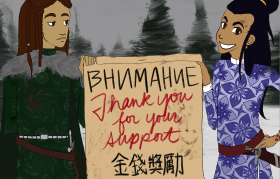
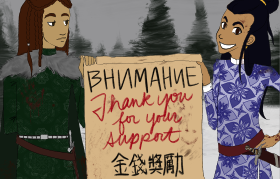
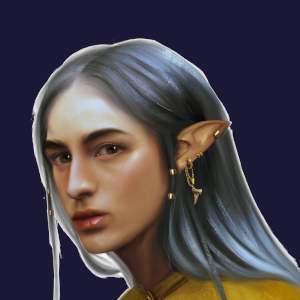
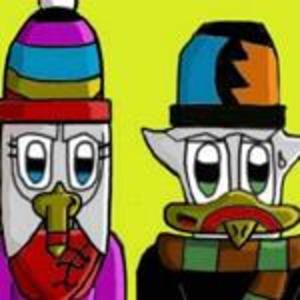







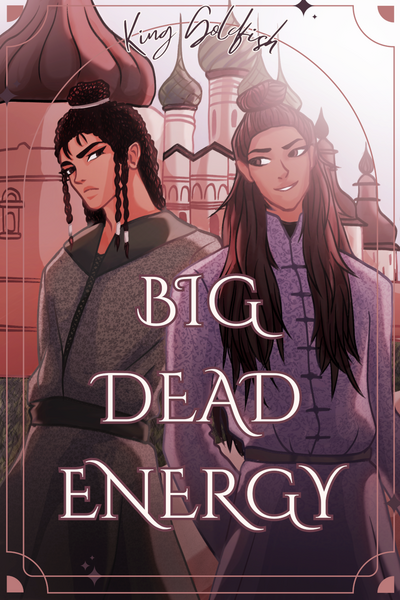
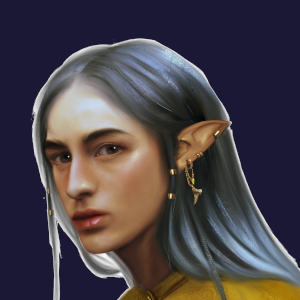
Comments (6)
See all